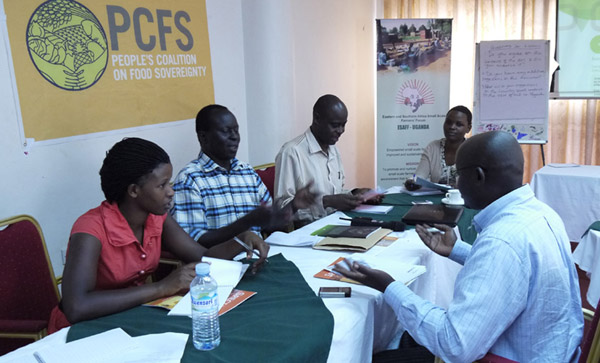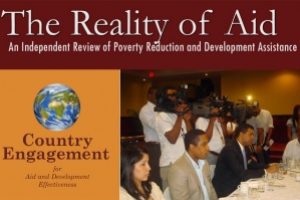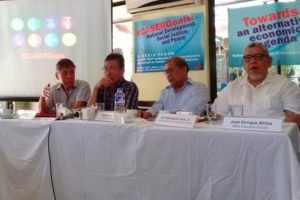[[{“type”:”media”,”view_mode”:”media_large”,”fid”:”122″,”attributes”:{“alt”:””,”class”:”media-image”,”height”:”174″,”style”:”width: 310px; height: 174px; margin: 10px; float: right;”,”typeof”:”foaf:Image”,”width”:”310″}}]]
The People’s Coalition on Food Sovereignty (PCFS), in partnership with IBON International’s Reality of Aid Network (RoA), Better Aid and partner civil society organizations (CSOs), went full swing in the conduct of trainings on food sovereignty and consultations on aid effectiveness in Agriculture and Rural development (ARD) in Nepal, India and Uganda in September.
The trainings and consultations form part of the network’s activities but this time with the use of a structured module that has been a product of a number of years’ research and actual conduct among members. The consultations, meanwhile, are part of the run-up to the High Level Forum on Aid Effectiveness (HLF4) which will be held from Nov. 29 to Dec. 1, 2011 in Busan, South Korea. PCFS is a member of the BetterAid Coordinating Group.
Nepal: Peasant movement upholds food sov
Last September 11-13, PCFS, RoA and BetterAid, in partnership with the All Nepal Peasants’ Federation (ANPFa), hosted a two-day workshop on food sovereignty, followed by a one-day consultation on aid and development effectiveness in ARD in Kathmandu, Nepal.
Participants came from remote regions of the country as well as the Kathmandu valley, representing peasants and pastoralists, women and Dalit rural peoples’ federations, and non-governmental organizations working on securing people’s right to food. The program was inaugurated by Bam Dev Gautam, former Deputy Prime Minister of Nepal.
IBON policy officer Tanya Roberts co-facilitated discussions on various topics, including campaigning and organizing based on the concepts and demands of food sovereignty, and articulating policies that reflect a food sovereignty paradigm. She also spoke about the particular demands that the PCFS will be bringing forward to the HLF4 in Busan on development effectiveness in Agriculture and Rural Development (see www.foodsov.org/).
The President of the NGO Federation of Nepal, Netra Timsina, Deputy General Secretary of ANFPa Balram Banskota, Secretary of ANPFa Hari Parajuli, and Dr. Keshab Khadka, senior researcher at ANFPa, provided key interventions and also facilitated various sessions.
The Nepali people are currently in the unique position of being among the minority of citizens in the world whose constitution includes the right to food sovereignty. However, representatives of Nepal’s rural peoples’ movements realize they must organize for food sovereignty to be actualized, and see genuine agrarian revolution as one of the most urgent demands that must be advanced. The participants resolved to continue their efforts in this direction. These same demands were further reiterated the following day, Sept. 14, during a gathering in Kathmandu of peasant youth advocates from across the country.
India: Joint event with TNWF in Tamil Nadu, Andhra Pradesh
On Sept. 16-18, women and farmers attended a similar three-day event on food sovereignty and aid effectiveness in ARD, co-organized with the Tamil Nadu Women’s Forum and held in Chennai, Tamil Nadu, India. Many of the speakers and participants expressed concern about the impacts of pesticides, fertilizers and other agrochemical inputs that are poisoning the people and environment in their communities, and strongly expressed the need to more widely promote and encourage organic farming methodologies in the context of food sovereignty. Some spoke passionately about the problems of land grabbing and the need for more equitable land distribution.
IBON’s Food, Agriculture and Rural Development program manager, Ms. Amy Padilla, and Tanya Roberts facilitated sessions on conceptualizing food sovereignty based on local realities, and on practical points for advocating and campaigning for policies that reflect the food sovereignty paradigm. TNWF resource persons helped in providing background on aid and development effectiveness as PCFS discussed its summary recommendations on aid effectiveness in ARD.
This was followed by another three-day activity in Chittoor, Andhra Pradesh, India on Sept. 19-21, in partnership with the agricultural workers’ union Andhra Pradesh Vyavasaya Vruthidarula (APVVU). The sessions were conducted in an engaging and popular manner, based on several group work and interactive discussions that encouraged participants to think critically about the concepts of food sovereignty and how these would be translated into policies and campaign plans.
Participants in the Chittoor sessions included adivasis (indigenous people), fisherfolk, peasants, and agricultural workers, with Dalits and women among them. PCFS helped in providing inputs on corporate globalization, Better Aid Key Messages and Proposals, PCFS recommendations on aid and development effectiveness in ARD, as well as a brief orientation about the Coalition. APVVU partners led by P. Chennaiah and A.J. Kumar provided the participants with valuable inputs by engaging them to thoroughly discuss the key topics among themselves and report these back in plenary.
Food sovereignty training in Uganda—a first
Meanwhile, Sept. 20-22 marked Uganda’s first training on food sovereignty, which was carried out with Eastern and Southern African Small Scale Farmers’ Forum (ESAFF-Uganda), a partner CSO. ESAFF-Uganda is part of a network of small-scale farmers’ associations that operate in Eastern and Southern African countries such as Burundi, Kenya, Lesotho, Madagascar, Malawi, Rwanda, Seychelles, South Africa, Tanzania and Zanzibar, Uganda, Zambia, and Zimbabwe.
The training, which brought together farmers from various areas as well as different CSOs, enabled them to share ideas, experiences and work on common messages for advocacy. Over 35 participants from ESAFF-Uganda, member CSOs, the media, members of the academe, and government officials particularly from the Ministry of Agriculture Animal Industry and Fisheries (MAAIF), attended.
Professor Ndebesa Mwambusya of Makerere University presented a module on Corporate Globalization in Uganda and its implications on food sovereignty. Mr. Roy Anunciacion of PCFS discussed the module on Mobilization and Campaign for People’s Coalition on Food Sovereignty and Aid and Aid Effectiveness in ARD.
For his part, Dr. Robert Ojara of Veterinarios Sin Fronteras (VSF) Uganda shared the module on Food Sovereignty as a basis for Rural Food and Agriculture Campaigning, Policy and Program. Mr. Alex Bambona, Head of Nutrition and Home Economics in MAAIF, discussed the institutional structure and policy framework of agriculture in Uganda, the relationship between MAAIF and the Office of the Prime Minister; an overview of agricultural programme implementation; and the opportunities available for cooperation and networking with CSOs and ESAFF.
Ms. Agnes Kirabo, the Communication and Advocacy Manager of VEDCO Uganda, meanwhile tackled the topics Food Sovereignty as a basis for Rural Food and Agriculture Campaigning, Policy and Program; and Campaigning and the Fight for Food Sovereignty. Lasty, Ms. Jane Nalunga, Executive Director of SEATINI Uganda, steered the participants in a session on country-level impact of aid on ARD.
Participants in the four training events all resolved to strengthen their advocacies and campaigns for food sovereignty, including making their voices heard by endorsing the PCFS’ recommendations to the upcoming HLF4 in South Korea.
Similar training and outreach activities with rural people’s advocates are ongoing in Kenya at this writing.


![[WEBINAR] On the Human Rights Situation in the Philippines: Lessons from the 4th Cycle of the Universal Periodic Review](https://iboninternational.org/wp-content/uploads/2023/02/327873979_5917321721660855_5378398432499176061_n-300x200.jpg)

